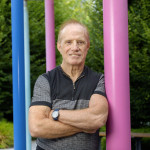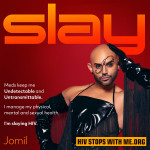Austin, Texas
Positive since 2014
I am the creative director of Revenj Jean Federation, a clothing brand that I spearhead design for. At times it has been an expression of who I am as a person, and what I may be feeling or going through. It has been an escape for me, and a way for me to deal with life.
I was diagnosed with HIV in early 2014. I had usually been very safe when it came to having sex, but for the first time in my life, I trusted a partner; that decision changed my life forever. Six weeks and two days after we slept together, I began to wake up in the middle of the night covered in sweat, and when I say covered, I mean it was as though someone had poured water all over me while I was sleeping. I had no idea what was wrong with me, so I googled “night sweats.” The first and only word I remember seeing was HIV. My heart sank, my vision blurred, and I put my phone down. I fell back asleep, but when I woke up the next morning, I knew that the night before hadn’t been a dream. I needed to face what had happened, whether it was HIV (I learned that night sweats are a symptom of the seroconversion process), or if there was something else wrong. I needed to settle my heart.
I let myself think about things for a couple of weeks, and then a cold night in February, I purchased ORAQUICK from a Walgreens down the street. That was the most terrifying night of my life. The worst part about it was that I had to attend a work dinner after I bought the kit, so the answer that could change my life had to wait. There were knots in my stomach all night. When I finally got home, I went straight to my room and was greeted by my dogs. They, of course, thought I was just fine. They wanted treats, and I had to shoo them aside.
The kit is easy to use. You open it and open the drawer with all of the supplies you need right there. There’s an instruction booklet and a “treatment and prevention” booklet. I read the instruction booklet, and it read: “Take the swab thing. Rub it on your gums. Put it in the vial filled with liquid. Wait 20 minutes.” Twenty minutes can be the longest time of your life. You’re supposed to turn the instruction book to a particular page, and it covers up the end of the stick that shows your result. I get it. Don’t stare at it; it’ll drive you crazy. I’ll admit I looked about halfway through, but there was no result. I must have looked at my phone every two minutes, hoping the next 10 minutes had passed.
Finally it was time. I went back over to my desk, and sat for a minute. I took a few deep breaths, and lifted the result page. My test showed two distinct lines, both on the “C” line and the “T” line, which meant I might have HIV. I think that at this point most people are overcome with emotion: sadness, depression, anger, hatred. What filled my head was an overwhelming sense of calm. Maybe I was numb; maybe it was my body’s defense. But to this day the calm is what I remember feeling about the result. I had convinced myself, with this kit, that I was HIV positive.
The next day I went to an AIDS services location here in Austin. I told them that I needed to get a confirmatory test. This entire appointment was a blur, but I remember they told me they would call me in a week, and I would come in and we would go over my results.
A week later I walked into the appointment, a little nervous about what would happen. My tester sat me down and asked how I was doing. “Fine, I’m doing fine.” Of course I was not doing fine. There were a million things running through my head. He said, “I have received the results of your test. Are you ready to receive them?” I’m no professional, and I’m sure there is some law somewhere that required him to ask these questions, but, I swear, the faster this was over, the better. I said yes. He said, “According to the Western Blot test, the confirmatory test this office uses, you are HIV positive. Are you OK?”
I thought I was fine. Both the home test and doctor’s office test confirmed I was positive. I had to sign a bunch of paperwork, and when I say a bunch I mean like to the point that my hand hurt. A lot of it was privacy stuff. During this time, a DIS (disease intervention specialist) asked to meet with me and go over my sexual history. He asked if I knew where I might have contracted this disease. I had never had unprotected sex except with the guy in the first paragraph of this story, so I was certain how I got it.
After meeting with the DIS, I made my first appointment with Dr. David Powell’s office in Austin. It was interesting to me that the AIDS services office put the responsibility of accessing care in one’s own hands, which I think is good. However, other people may not handle this as well as I did; they may turn inward and never seek treatment.
When I was diagnosed with HIV, I shut out the outside world. My clothing brand and designing became my way to cope. When I was diagnosed with HIV, my thoughts about the virus changed in a flash. I realized that HIV could affect anyone and everyone. It has no racial, economical, gender or sexual orientation bias. After I dealt with the coping process, I knew that I needed to help other people avoid this situation. We need to educate our youth, and through education, rid the world of the stigma surrounding HIV and eventually the disease itself.
So this is where I stand today. I am in treatment and adhering to my medicine 100 percent. I have an undetectable viral load and I am as happy as can be. Soon after my diagnosis I met a guy who would turn out to be the love of my life. He has been nothing but supportive of me and my advocacy efforts. We are a serodiscordant couple: He is negative, and we take all necessary precautions to make sure he remains that way. Before being diagnosed, I would have never even thought this would be possible, but HIV isn’t what it was in the ’80s. Today we know more than ever about this disease. I truly believe that we will find a cure in my lifetime.
What three adjectives best describe you?
Confident, ambitious, grateful
What is your greatest achievement?
I believe that my greatest achievement to date would be my entire life. I wouldn’t change a thing about it and am proud of what I’ve done and can’t wait to achieve everything I plan to.
What is your greatest regret?
My only regret is that I stopped playing the flute after six years because of being bullied in high school.
What keeps you up at night?
My infinite dreams and aspirations
If you could change one thing about living with HIV, what would it be?
The stigma. That is the one thing holding us back from ridding the world of this disease.
What is the best advice you ever received?
Chris Richey of The Stigma Project advised me to “be ready” regarding going public about my HIV status. Everyone else told me to keep quiet about it. Listening to him was the best thing I’ve ever done.
What person in the HIV/AIDS community do you most admire?
Chris Richey of The Stigma Project, or Marie Fisher of Gilead
What drives you to do what you do?
The hope that we can see a world free of stigma, where we can concentrate on treating and eventually curing people of the disease
What is your motto?
We can’t become what we need to be by remaining what we are.
If you had to evacuate your house immediately, what is the one thing you would grab on the way out?
My three dogs
If you could be any animal, what would you be? And why?
Probably a frog or a bird. I’d love to see the world from either of those perspectives.
Editor’s Note: Gregry Revenj was a 2014 POZ 100 honoree: http://www.poz.com/articles/poz100_p_r_2891_26432.shtml







Comments
Comments